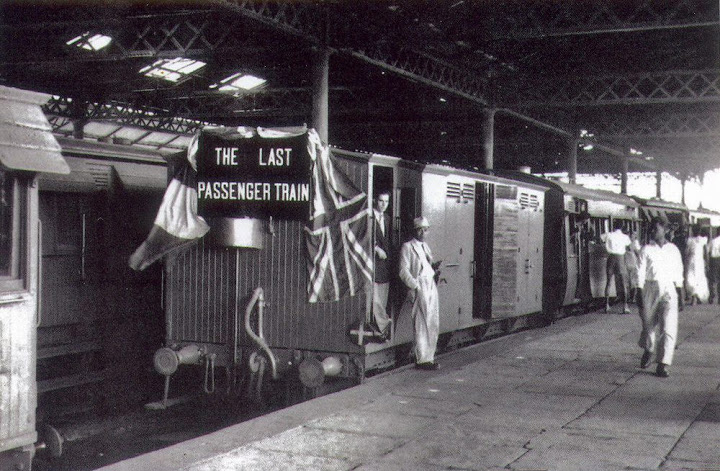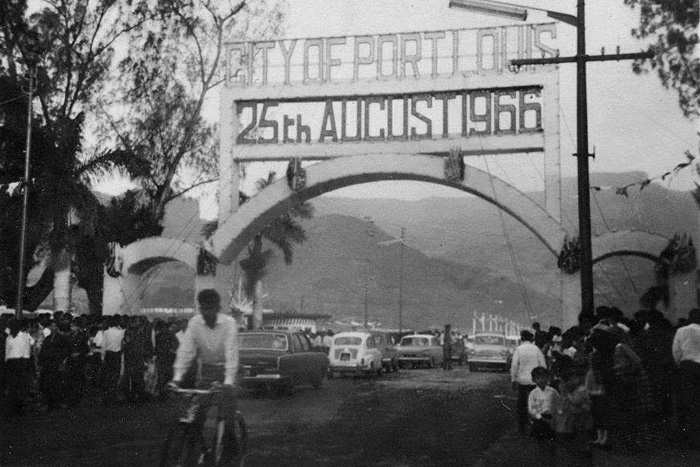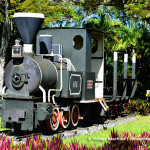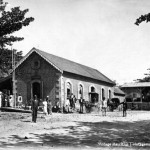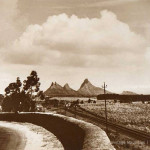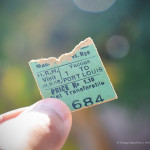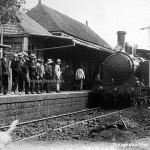10th century – Phoenicians, Malays, Swahili and Arab seamen visit island but do not settle. Island named Dina Robin by Arab mariners.
1498 – Portuguese explorers stumble upon Mauritius in the wake of Vasco da Gama’s voyage around the Cape of Good Hope.
1510 – Portuguese navigator Pedro Mascarenhas visits the island and names it Cirné. It is used as a port of call, but the Portuguese do not establish a permanent settlement.
Early settlement
1598 – Dutch claim the uninhabited island and rename it after their head of state, Maurice, Prince of Orange and Count of Nassau.
1638-58 – Dutch settlement begins, but colony soon fails.
1664-1710 – Second Dutch attempt at colonisation fails. The Dutch withdraw permanently. By this time the dodo – a unique bird found only on Mauritius – has become extinct. Pirates inhabit the island.
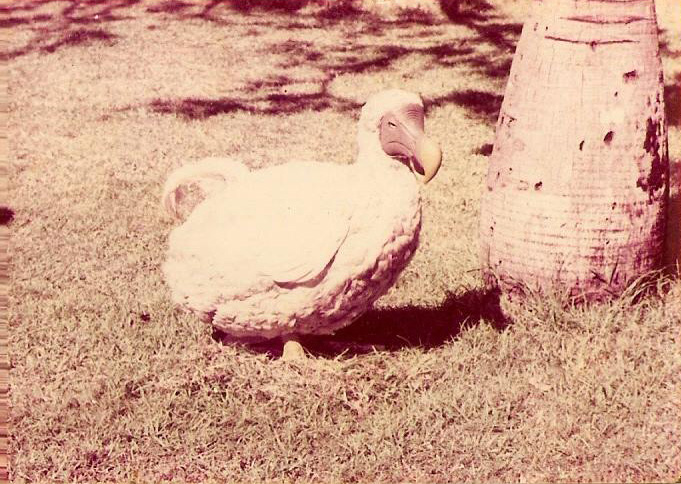
Representation of the extinct Dodo Bird – Mauritius – Port Louis Museum – (Courtesy: France Athow)
1715 – French East India Company claims Mauritius for France, renames it Ile de France.
1721-67 – Settlement begins; Port Louis founded as a base for attacking the British in India.
1767 – French East Indies Company sells Mauritius; control of island transferred to French government.
1796 – Settlers break away from French control when the government in Paris attempts to abolish slavery.
1810 – British forces land in Mauritius after defeating the French in Battle at Vieux Grand Port.
British rule
1812 – Colonel Draper founds the Mauritius Turf Club, which opens the first racecourse in the southern hemisphere and the second oldest in the world.
1814 – Mauritius, Seychelles and Rodrigues ceded to Britain under Treaty of Paris.
1834 – British abolish slavery. It is phased out on the island under a transition period known as “apprenticeship”.
1835 – Indentured labour system introduced. In subsequent decades hundreds of thousands of workers arrive from India.
1847 – Incorrectly-worded Penny Black postage stamps are issued in Mauritius; later they become among the most sought-after stamps in the world.
1864 – Mauritius introduces Railway Transport. The main railway lines began operation.
1866-68 – Malaria epidemic kills more than 40,000 people after Anopheles mosquito accidently introduced.
1876 – Indian rupee becomes official currency.
1892 – Major fire outbreak devastates La Chaussée in Port Louis.
1901 – Mahatma Gandhi visits.
1906 – Telecommunication systems established: Cable link with Reunion and Madagascar. Outbreak of Influenza epidemic, 4000 dead.
1910 – Indentured labour system abolished.
Between 1834-1910, 451,776 Indians were brought to Mauritius to work on the sugar estates, of which 157,639 returned to India.
1913 – First co-operative society founded in Mauritius at Montagne Longue following recommendations of a Royal Commission Report.
1917 – Outbreak of Plague epidemy in Mauritius.
1920 – Last Batch of Indian Immigrants land in Port Louis.
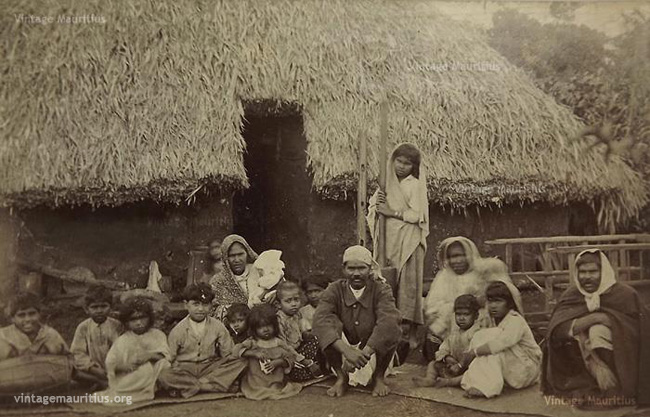
Indian Family – Indentured Labourers – Vacoas Mauritius – 1920s
1926 – First Indo-Mauritians elected to government council.
1930 – Mauritius faces severe econimic recession with low prices of sugar on the world market.
1934 – Mauritius introduces first rupee currency.
1936 – Politician Dr Maurice Cure founds Mauritian Labour Party (MLP), or Parti Travailliste.
1937 – Social unrest starts at Union Flacq Estate owned by R.Gujadhur. Workers claim higher wages and protests on the sugar estate; gunshots fired: 4 killed, 6 injured. Rioters demand better economic conditions and participation in government.
Further violence spreads throughout the country with trade union activists.
Pandit Sahadeo put under house arrest and Emmanuel Anquetil exiled to Rodrigues.
1938 – Department of Electricity and Telephones established.
Dockers strike in the port; all activities related to sugar loading paralysed.
Towards independence
1940 – Dr Sir Seewoosagur Ramgoolam nominated by Governor Bede Clifford to represent one of the two indians who represented indian interests in the Government Council.
1942 – Donald Mackenzie-Kennedy becomes governor. Introduces consultative committee which for the first time includes representatives from all Mauritian communities.
1943 – Sugar workers claim more increase in wages. Rioting on Belle Vue estate ending up with gunshots: 3 killed, 16 injured (among, one pregnant woman named Anjalay)
1944 – 3 Successive severe cyclones hit Mauritius causing severe damages to plantations and houses.
First commercial flight between Mauritius and France. Air France inaugurates civil aviation.
1947 – Last “Les Courses Malbar” boycott at Champ de Mars by sugar industry workers.
1948 – New constitution gives the vote to many Indians and Creoles in an enlarged legislature.
1951 – Commonwealth Sugar Agreement signed. Mauritius sells 60% of its sugar production to Great Britain.
1956 – Passenger Railway Transport was ended. On 31 March 1956, the last passenger train waved a final goodbye, even though goods train continued to operate until 1964.
September: Princess Margaret visits Mauritius.
1957 – Internal self-government introduced, with an electoral system based on the Westminster model.
1958 – New constitution – all adults over 21 can vote. Island divided into four single-member constituencies.
1959 – First elections under universal adult suffrage won by MLP, led by Seewoosagur Ramgoolam.
1960 – Two intense Cyclone Carol & Alix devastates island, leaving thousands homeless and prompting a housing revolution.
Family planning introduced to curb growth of birth rate in Mauritius.
1961 – Constitutional conference in London. The PMSD (Parti Militant Socialist Democrate) opposes independence and favors integration with Great Britain.
1964 – Ethnic rioting; In May 1964, Hindu and Creole communities clashed in the village of Trois Boutiques, outside Souillac. One police officer and one Franco-Mauritian were killed. At the same time all railway transport was ended, specially goods transportation, and lines were dismantled.
1965 – Constitutional conference held in London to discuss independence. Labour Party’s delegation plead for independence. PMSD favour association with Great Britain. British side reluctant to grant independence and persuade Dr. Ramgoolam to cede Chagos Islands and evcuation of its inhabitants against Independence.
1966 – Britain drives out some 2,000 residents of the Chagos archipelago, in the Indian Ocean. Many are sent to Mauritius. Britain leases the Chagos islands to the US for 50 years. The US builds a military base on the largest island, Diego Garcia.
August – Port Louis changes status from Town to City
1967 – General Elections towards Independence, Riot in Port Louis; Muslims and Creoles/Chinese clash.
Mass immigration to Australia and Great Britain.
Independence
1968 – Ethnic rioting, in early 1968, just six weeks before independence, violence between Creoles and Muslims in the nation’s capital left at least twenty-five people dead and hundreds injured before British troops quelled the fighting. 12 March – Independence.
1969 – Opposition Mauritian Militant Movement (MMM) founded, advocates socialism, led by Paul Berenger.
1970 – Indian Prime Minister, Indira Gandhi on state visit to Mauritius, lays foundation stone of the Mahatma Gandhi Institute.
1971 – First Export Processing Zone created. Textiles sector develops. Between 1971-77, 64,000 jobs are created.
1971 – MMM, backed by unions, calls a series of strikes. State of emergency declared, lasts until 1976. MMM party’s leadership imprisoned.
1972 – Her Royal Highness Pricess Alexandra visits Mauritius and inaugurates the University of Mauritius as Chancellor.
Her Majesty Queen Elizabeth II & Prince Philip Visits Mauritius.
Egyptian Cargo Ship SS Tayeb wrecks off the west coast on Barkly Island, near the Harbour. Event occurred after the passage of Cyclone Dolly
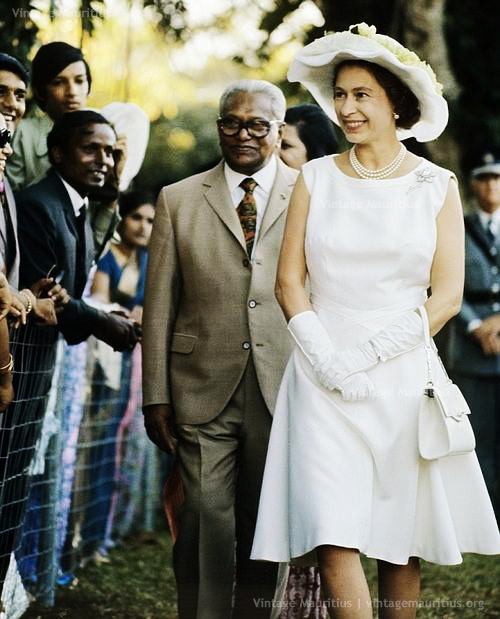
Queen Elizabeth Visit Mauritius – and Sir Seewoosagur Ramgoolam – March 1972
1975 – Cyclone Gervaise devastates the island with many homeless and worths of damage.
Rose Belle Accident, lorry crashes into home.
Colour television is introduced in Mauritius followed by colour video.
Students strike in Mauritius. All schools closed (May)
Mauritius joins the space age with installation of a 10-metre diameter satellite antenna.
1976 – World Soccer star player Pele visits Mauritius.
Second state visit by Indian Prime Minister Indira Gandhi.
Free secondary education introduced for all Mauritians.
1977 – Telecommunications: first data transmission to London from Mauritius.
Founder of Labour Party, Dr. Maurice Cure dies.
1979 – Cyclone Claudette devastates island.
Mauritius approaches IMF and World Bank for assistance. Country has deficit of $111 million.
Jugnauth elected
1982 – Sir Anerood Jugnauth becomes prime minister. Sweeping 60-0 victory of the PSM-MMM.
1985 – Seewoosagur Ramgoolam, father of nation, dies.
1985 – Drugs scandal at Amsterdam airport; four MPs arrested on charges of drug smuggling. Inquiry in 1986 implicates three members of Legislative Assembly. Six more politicians are accused in 1987 of involvement in the affair.
1989 – Stock Exchange opens in Port Louis.
Pope John Paul II on state visit to Mauritius (October14).
Republic
1991 December – Legislative Assembly approves the transition of the nation to a republic within the Commonwealth.
1992 March – Prime Minister Jugnauth declares Mauritius a republic. Legislative Assembly redesignated National Assembly and incumbent governor, General Ringadoo, becomes president.
1992 June – MMM member Cassam Uteem elected president.
1994 – Cyclone Hollanda leaves 1,400 people homeless and causes $81m in damage.
1995 December – MLP leader Navin Ramgoolam becomes prime minister.
1996 – Death of Sir Gaetan duval. Popular tribute to the former leader of PMSD.
1999 February – Creole singer Kaya dies in police custody, prompting four days of rioting among Creole community.
1999 – The fire at l’Amicale causing the death of 9 persons owing to acts of hooliganism following a football match between Fire Brigade vs Scouts leading thereafter to the suspension of the national football league.
2000 – Mauritius secures a seat on the United Nations Security Council for the first time.
2000 – September – MSM leader Sir Anerood Jugnauth becomes prime minister.
2000 November – High Court in London rules that Britain acted unlawfully in driving the inhabitants of the Chagos archipelago from their homes in 1966. Many of the exiles settled in Mauritius.
2002 February – Cassam Uteem resigns as president, refusing to sign controversial anti-terrorism bill. Vice president also refuses to sign and resigns. Head of legislature becomes acting president and passes legislation into law.
2002 – Karl Hoffman elected president by National Assembly.
2002 – “Cyber Cities” plan launched to create concentrations of hi-tech facilities and boost economy.
2003 – Anerood Jugnauth hands over leadership of MSM to his son, Pravind.
2003 September – Anerood Jugnauth hands over power to Paul Berenger, who becomes the island’s first non-Hindu Prime Minister.
Labour in power
2005 July – Navin Ramgoolam wins general election, returns as prime minister.
2006 April – One hundred former residents of the Chagos Archipelago – claimed by Mauritius – make a return visit nearly 40 years after being evicted by Britain to make way for a US military base on the island of Diego Garcia. Their legal battle with Britain continues.
2008 May – British House of Lords upholds a UK government appeal against court ruling that families expelled from the Chagos Islands are entitled to return home. The decision ends the Chagossians’ long-running UK legal battle to return.
2010 May – Ruling coalition of PM Navin Ramgoolam wins general election.
2010 June – Mauritius, France agree to jointly manage Tromelin, a tiny Indian Ocean island owned by France but claimed by Mauritius.
2010 December – Mauritius launches a legal action contesting Britain’s creation of a Marine Protection Area around its Indian Ocean territory of the Chagos Islands, after the website Wikileaks revealed that a UK official thought setting up a marine reserve should end any possibility of displaced islanders being allowed back.
2011 August – Militant Socialist Movement (MSM) quits the ruling coalition in a row over corruption allegations. Its leader Pravind Jugnauth is later arrested.
2012 March – President Anerood Jugnauth steps down saying he wants to return to party politics and challenge the prime minister.
2012 June – Britain signs a deal with Mauritius allowing suspected pirates caught by its Royal Navy to be transferred to the Indian Ocean island to face prosecution.
2012 December – European Court of Human Rights rejects claim by Chagos Islanders against Britain over their expulsion.
2013 – Michaela Harte murder during her honey-moon at Legends hotel, case still unsolved. Severe impact on tourism in Mauritius.
2013 March-April – At least 11 people die as sudden rains flood the capital Port Louis. Prime Minister Navin Ramgoolam blames climate change.
2013 – Mauritius pulls out of hosting the 2015 Commonwealth Heads of Government Meeting after boycotting the 2013 event in Sri Lanka over the country’s human rights record.
2013 – Soreze bus accident with 9 victims, followed by NTC employees engaging into a strike.
Source: http://www.bbc.com/news/world-africa-13882731 +partly modified with added events not mentioned at source.




